2022届高考英语 二轮专题复习一般现在时宾语从句否定前移的反义疑问句课件(18张ppt)
文档属性
| 名称 | 2022届高考英语 二轮专题复习一般现在时宾语从句否定前移的反义疑问句课件(18张ppt) |  | |
| 格式 | zip | ||
| 文件大小 | 600.2KB | ||
| 资源类型 | 教案 | ||
| 版本资源 | 人教版(2019) | ||
| 科目 | 英语 | ||
| 更新时间 | 2022-02-07 13:40:28 | ||
图片预览

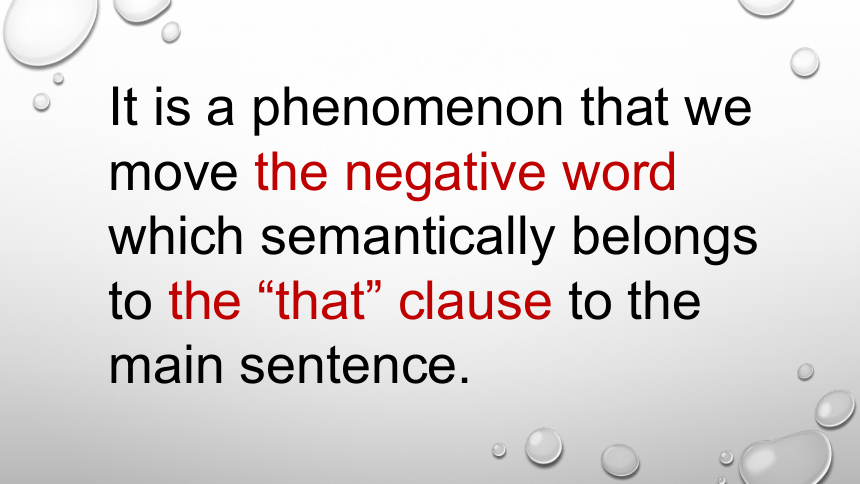
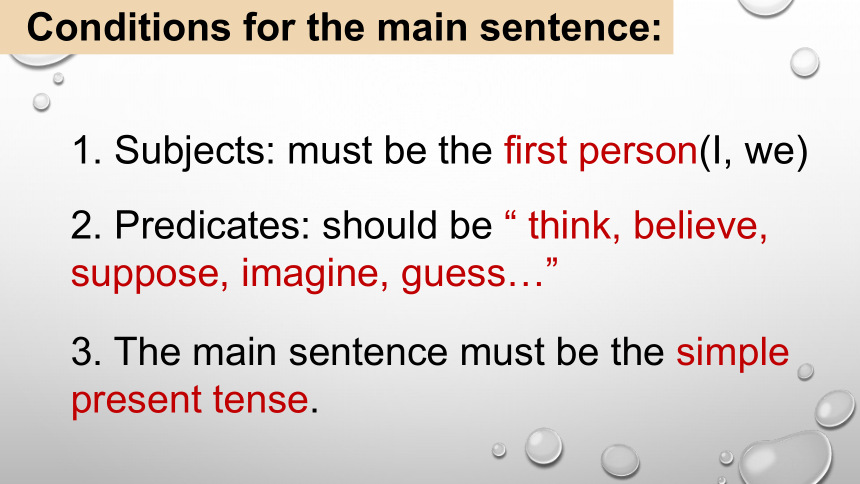
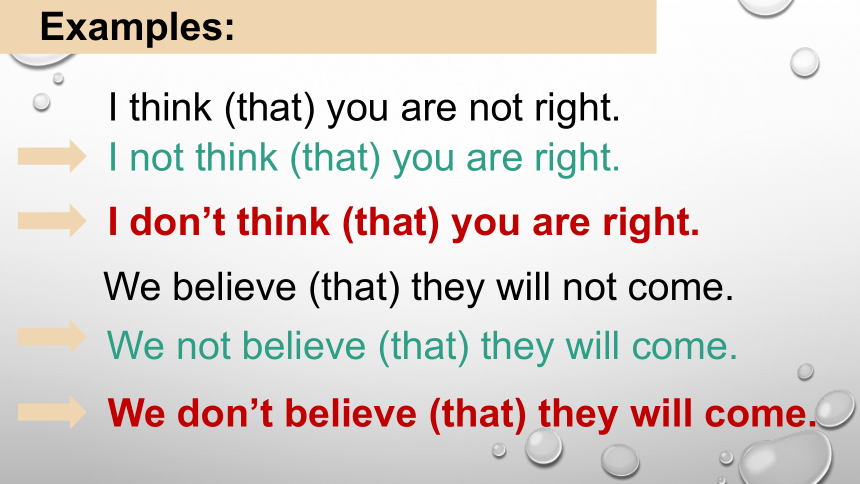

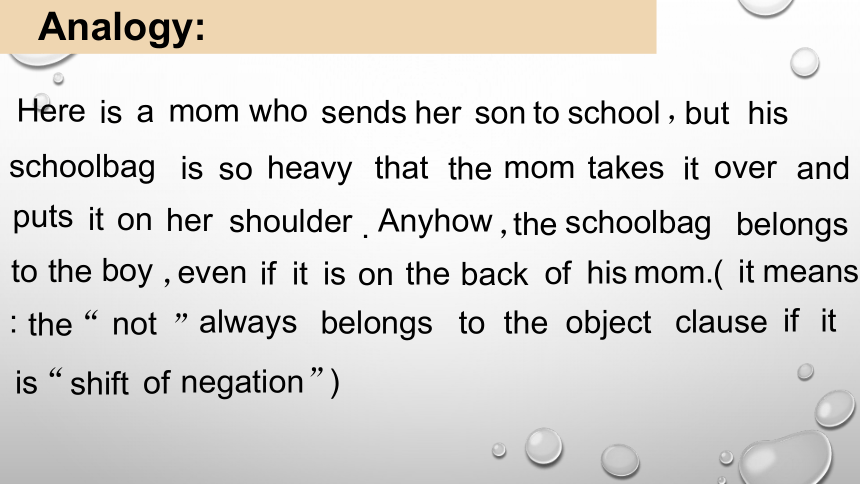
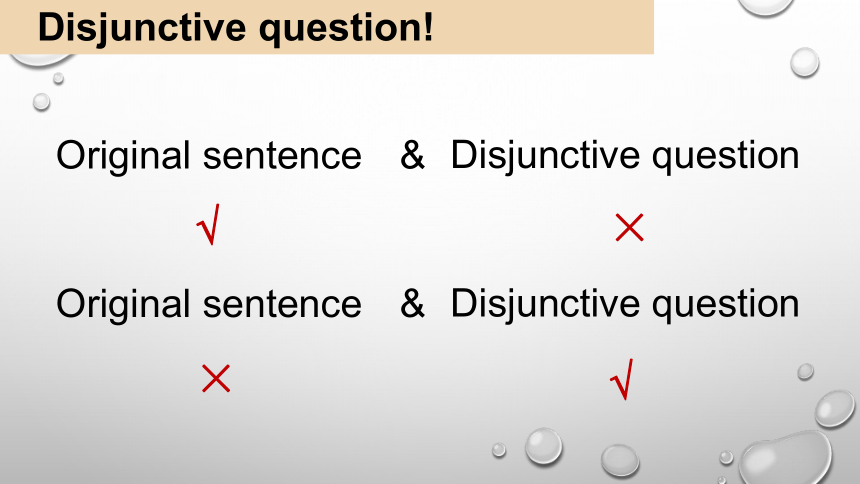
文档简介
(共18张PPT)
Shift of negation
It is a phenomenon that we move the negative word which semantically belongs to the “that” clause to the main sentence.
Conditions for the main sentence:
1. Subjects: must be the first person(I, we)
2. Predicates: should be “ think, believe,
suppose, imagine, guess…”
3. The main sentence must be the simple
present tense.
I not think (that) you are right.
We not believe (that) they will come.
We believe (that) they will not come.
I think (that) you are not right.
I don’t think (that) you are right.
We don’t believe (that) they will come.
Examples:
She think (that) you are not right.
Please meditate:
她认为你不对。
She doesn’t think (that) you are right.
她不认为你是对的。
Here
is
a
mom
who
sends
her
son
to
school
,
but
his
schoolbag
is
so
heavy
that
the
mom
takes
it
over
and
puts
it
on
her
shoulder
.
Anyhow
,
the
schoolbag
belongs
to
the
boy
,
even
if
it
is
on
the
back
of
his
mom
.
(
it
means
:
the
“
not
”
always
belongs
to
the
object
clause
if
it
is
“
shift
of
negation
”
)
Analogy:
Disjunctive question!
Original sentence
Disjunctive question
&
Original sentence
Disjunctive question
&
√
×
×
√
I don’t think you are right,
She doesn’t think you are right,
are you
does she
She thinks you are not right, ?
doesn’t she
Disjunctive question!
1, If the sentence belongs to “shift of negation”, the disjunctive question should be consistent with the object clause.(positive)
2, If the sentence doesn’t belong to “shift of negation”, the disjunctive question should be contrary to the main sentence.
A: Main sentence: negative-------- disjunctive question: positive
B: Main sentence: positive-------- disjunctive question: negative
We can reach the conclusion that:
一般现在时
一. 表示经常性的、反复发生的动作,常与一些时间状语连用。
i often play badminton in theafternoon.
我经常在下午打羽毛球。
表示现在的状态或主语的特征、习惯、职业。
my brother is a police officer.
我的哥哥是一名警官。
一般现在时
二. be动词(am/is/are)的一般现在时
这是对一种状态的描述。
i am in the classroom.
我在教室里。(指的就是现在我的位置)
he is tall.
他很高。(指他目前的身高)
we are happy.
我们很快乐。(指现在我们的感觉)
三. 基本句型:I do…(do指代实义动词)I run every day.我每天跑步。I go to the park on Sundays.我每周日去公园。I see a flower.我看到一朵花。(这里的run,go,see就是实义动词,在句中用原形。)
一般疑问句:do you like your journey?
你喜欢你这次旅行吗?
陈述句:i wait here every day.
我每天等在这里。
一般疑问句:do you wait here every day?
你每天都等在这里吗?
否定句的构成
主语 + 助动词(do/does)+not +动词原形
These boys don’t(do not) like playing football.
The girl doesn’t (does not)read English every morning.
The girl reads English every morning.
These boys like playing football.
I like green
2. They like oranges.
3.We take a bus to school every day.
I don’t like green.
They don’t like oranges.
We don’t walk to school every day.
10
exercise
1、kitty an english girl.
2、we students.
3、i from taizhou.
4、she tall.
5、lucy and lily good friends.
6、those chairs broken.
7、the bag mine.
is
are
am
is
are
are
is
Thank you !
Shift of negation
It is a phenomenon that we move the negative word which semantically belongs to the “that” clause to the main sentence.
Conditions for the main sentence:
1. Subjects: must be the first person(I, we)
2. Predicates: should be “ think, believe,
suppose, imagine, guess…”
3. The main sentence must be the simple
present tense.
I not think (that) you are right.
We not believe (that) they will come.
We believe (that) they will not come.
I think (that) you are not right.
I don’t think (that) you are right.
We don’t believe (that) they will come.
Examples:
She think (that) you are not right.
Please meditate:
她认为你不对。
She doesn’t think (that) you are right.
她不认为你是对的。
Here
is
a
mom
who
sends
her
son
to
school
,
but
his
schoolbag
is
so
heavy
that
the
mom
takes
it
over
and
puts
it
on
her
shoulder
.
Anyhow
,
the
schoolbag
belongs
to
the
boy
,
even
if
it
is
on
the
back
of
his
mom
.
(
it
means
:
the
“
not
”
always
belongs
to
the
object
clause
if
it
is
“
shift
of
negation
”
)
Analogy:
Disjunctive question!
Original sentence
Disjunctive question
&
Original sentence
Disjunctive question
&
√
×
×
√
I don’t think you are right,
She doesn’t think you are right,
are you
does she
She thinks you are not right, ?
doesn’t she
Disjunctive question!
1, If the sentence belongs to “shift of negation”, the disjunctive question should be consistent with the object clause.(positive)
2, If the sentence doesn’t belong to “shift of negation”, the disjunctive question should be contrary to the main sentence.
A: Main sentence: negative-------- disjunctive question: positive
B: Main sentence: positive-------- disjunctive question: negative
We can reach the conclusion that:
一般现在时
一. 表示经常性的、反复发生的动作,常与一些时间状语连用。
i often play badminton in theafternoon.
我经常在下午打羽毛球。
表示现在的状态或主语的特征、习惯、职业。
my brother is a police officer.
我的哥哥是一名警官。
一般现在时
二. be动词(am/is/are)的一般现在时
这是对一种状态的描述。
i am in the classroom.
我在教室里。(指的就是现在我的位置)
he is tall.
他很高。(指他目前的身高)
we are happy.
我们很快乐。(指现在我们的感觉)
三. 基本句型:I do…(do指代实义动词)I run every day.我每天跑步。I go to the park on Sundays.我每周日去公园。I see a flower.我看到一朵花。(这里的run,go,see就是实义动词,在句中用原形。)
一般疑问句:do you like your journey?
你喜欢你这次旅行吗?
陈述句:i wait here every day.
我每天等在这里。
一般疑问句:do you wait here every day?
你每天都等在这里吗?
否定句的构成
主语 + 助动词(do/does)+not +动词原形
These boys don’t(do not) like playing football.
The girl doesn’t (does not)read English every morning.
The girl reads English every morning.
These boys like playing football.
I like green
2. They like oranges.
3.We take a bus to school every day.
I don’t like green.
They don’t like oranges.
We don’t walk to school every day.
10
exercise
1、kitty an english girl.
2、we students.
3、i from taizhou.
4、she tall.
5、lucy and lily good friends.
6、those chairs broken.
7、the bag mine.
is
are
am
is
are
are
is
Thank you !
